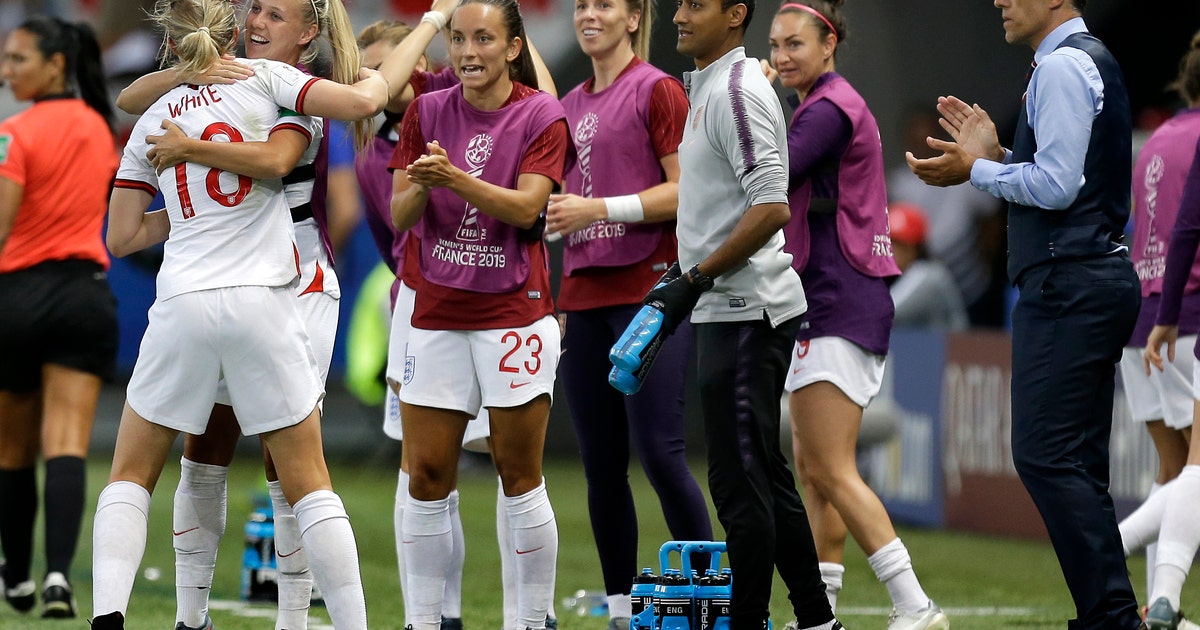Phil Neville brought winning mentality to England


LYON, France (AP) — Phil Neville’s path to the Women’s World Cup semifinals began with a phone call persuading him to consider the England manager’s job.
Late in 2017, Sue Campbell, the baroness in charge of English women’s soccer, was bemoaning the lack of female coaches to fill the vacancy after assessing 147 potential candidates from across the world.
When Neville’s name was floated to Campbell as a possible replacement for Mark Sampson, he seemed an unlikely candidate. Not only did Neville lack experience in the women’s game, but he had never led a team at any level, though he had been a coach under other managers.
But Campbell thought it was worth a call to the former title-winning player with Manchester United who also had 59 appearances for England.
“I remember the first day I spoke to him on the phone, I’d never met him before,” Campbell told The Associated Press on the eve of England’s game against the United States in the World Cup semifinal on Tuesday. “I was speaking to see whether he would apply for the role. We must have talked for an hour and a half and I put the phone down and I just looked up and said, ‘That is who I’m looking for.’
“I could sense it. Just his emotional intelligence, his winning mentality, his absolute commitment to the women’s game in terms of wanting to grow women coaches.”
The reaction to Neville’s appointment in January 2018 was “skeptical,” as Campbell recalls. The early days in the job were blemished by Neville apologizing for old sexist tweets and the FA faced criticism for overlooking women for the post.
“One of the first things he said to me is, ‘A woman should be doing this job,’” Campbell recalled. “And I said, ‘Yes but you know that isn’t where we are at this moment.’ He said, ‘Well I’ll help you develop women coaches.’ And he has. So he’s lived out everything I expected of him and more. He’s been tremendous.”
An early mission was winning over players who only previously encountered him from afar during his playing career.
“We were a bit surprised, I think everyone was,” forward Fran Kirby said of Neville’s hiring. “When he first took the job he probably wasn’t as aware as many others of the players he had, but we could see he believed in us straightaway.”
Neville encourages his players to express themselves, which produced hardware in March when England won the invitational SheBelieves Cup featuring the U.S, France, and Germany.
“He’s put a lot of confidence in us to be more brave on the ball and play out from the back,” defender Millie Bright said. “No matter what the other team comes up with, whether that’s a press or a low block. His attitude is that he’s never going to shout at us for making a mistake.”
Not that there have been many mistakes over the last month as England has made the semifinals with five victories, only conceding once — in the group stage opener against Scotland.
A turning point for Neville was the team bonding training camp in the Middle East in January, while still pained by a 2-0 loss to Sweden in November.
“My whole Christmas was ruined by that Sweden game,” Neville said. “It wasn’t losing, it was the fact I didn’t have that smile. So we took them to Qatar.”
There was a trip into the desert and a night out celebrating Neville’s 42nd birthday.
“That was the particular night I turned to my assistant (Bev Priestman) and said, ‘We’ve got it now,’ because we came together,” he recalled. “We put everything on the table. If we didn’t like each other, friendship groups, whatever, we stripped it bare and laid it on the table. There was a lot of honest conversations and we came out of Qatar and won SheBelieves. And from then on we’ve been like a steam train.”
The bond with the squad has seen Neville publicly display a warmth and empathy that becomes clear when celebrating goals, conducting team talks on the field or consoling players.
He has also been blunt calling out the conduct of opponents at the World Cup: Denouncing Cameroon’s behavior in the round of 16 and chiding the Americans for “bad etiquette” for scoping out the England team hotel in Lyon. The winner of Tuesday’s match gets to stay in that hotel.
“He never lets a day go past when he isn’t messaging us on our groups, telling us to makes sure attack the day and make the most of it,” forward Nikita Parris said. “He does everything in our power to make sure we win. In every training session he’ll make sure he goes on the winning team photo. That’s his mentality. He got that at Manchester United under Alex Ferguson who as we all know was an incredible manager and a winning one.”
Neville has also had setbacks since setting out on his coaching journey in 2012.
“I lost my job at United, I lost my job at Valencia, it happens,” Neville said. “Football is like that. I don’t go into a game thinking about losing, I go into a game thinking I am going to have fun.”
The team was in a bad place after Euro 2017, despite Sampson leading England to the semifinals as he had done at the 2015 World Cup. A storm of scandal deepened around Sampson, which ultimately ended up in a British parliamentary committee hearing with English Football Association officials being grilled and players giving damning evidence against the governing body’s leadership.
Sampson was fired over “inappropriate and unacceptable behavior” in a separate case focusing on relations with female players in a previous job. But Sampson was also found to have racially discriminated against two of his players in a drawn-out case that put the rigor of FA investigations under scrutiny and led to a “cultural review.”
As the FA’s head of women’s soccer, Campbell makes herself available to listen to any concerns the squad has. Not that there are many with Neville at the helm.
“I saw them through a rather difficult period prior to Phil’s arrival,” Campbell said. “Sometimes it’s useful for me just to be able to sit and chat to people. So if they have got something that’s troubling them it’s easy to say, ‘Have you got a minute?’ And for me to spend that time.”
There is also a lot of time spent by Campbell with Neville. She has been sitting in on many of his news conferences in France and they speak almost daily.
“I always remember somebody when I was early on asking about,” Campbell said. “People said to me he’s as a student of the game. He’s a learner, he’s constantly wanting to know more. He asked me, ‘Could you set it for me to go and see people who’ve been really successful in other sports so I can go listen and learn?’
“He’s constantly hungry. That’s the sign of a great coach. Someone who is not arrogant. It doesn’t mean they know it or have all the answers. He is constantly asking questions and he’s still doing that.”
And by Sunday night he could be the first England coach since Alf Ramsey with the men in 1966 to win a soccer World Cup.







